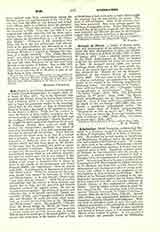

Rohrbacher, RENE FRANCOIS, ecclesiastical historian, b. at Langatte (Langd) in the present Diocese of Metz, September 27, 1789; d. in Paris, January 17, 1856. He studied for several months at Sarrebourg and Phalsebourg (Pfalzburg) and at the age of seventeen had completed his Classical studies. He taught for three years at the college of Phalsebourg; entered in 1810 the ecclesiastical seminary at Nancy, and was ordained priest in 1812. Appointed assistant priest at Insming, he was transferred after six months to Luneville. A mission which he preached in 1821 at Flavigny led to the organization of a diocesan mission band. Several years later he became a member of the Congregation of St. Peter founded by Felicite and Jean de La Mennais, and from 1827 to 1835 directed the philosophical and theological studies of young ecclesiastics who wished to become the assistants of the two brothers in their religious undertakings. When Felicite de La Mennais refused to submit to the condemnation pronounced against him by Rome, Rohrbacher separated from him and became professor of Church history at the ecclesiastical seminary of Nancy. Later he retired to Paris where he spent the last years of his life. His principal work is his monumental “Histoire Universelle de l’Eglise Catholique” (Nancy, 1842-49; 2nd ed., Paris, 1849-53). Several other editions were subsequently published and continuations added by Chantrel and Guillaume. Written from an apologetic point of view, the work contributed enormously to the extirpation of Gallicanism in the Church of France. Though at times uncritical and devoid of literary grace, it is of considerable use-fulness to the student of history. It was translated into German and partially recast by Hulskamp, Rump, and numerous other writers. (For the other works of Rohrbacher, see Hurter, “Nomenclator Lit.”, III [Innsbruck, 1895], 1069-71.)
N. A. WEBER

